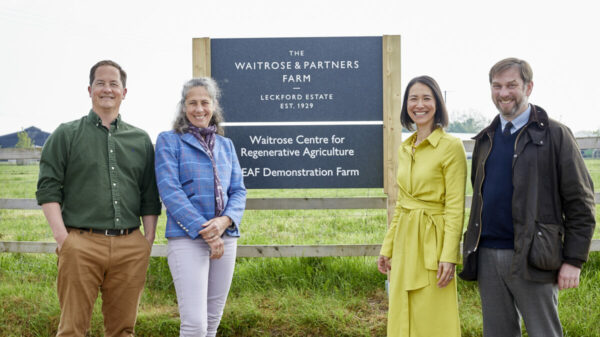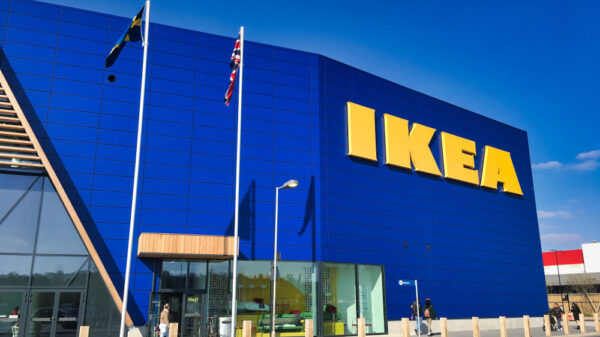Second-hand, pre-loved, recycled or vintage – it doesn’t really matter what you call it, the fashion for buying pre-owned clothes has been taking hold for some time now.
As consumers become increasingly aware of the environmental and social ramifications of buying cheaper clothes which will only be worn once or twice (if at all), fast fashion has begun to fall slowly out of favour.
Pre-loved clothes are typically cheaper as well, making the sustainability credentials of buying second-hand even more appealing to a younger, cash-strapped demographic.
According to figures from Wrap, the average UK adult owns 118 items of clothing – but has not worn 26% of them in the last year. So what do consumers do with all these unworn items? Selling them on makes perfect sense, and a growing number of fashion-focused online resale sites such as Vinted and Depop have begun to pop up to meet exactly this demand.
Even Love Island, the reality show previously synonymous with fast fashion brands, has been sponsored by eBay for the second year, a fashion-focused partnership that truly embraces the circular economy. Clothes are bought second-hand and then left in the villa for islanders to reuse year after year.
In response to these changes – and to boost their own sustainability drives – fashion retailers have also been quick to jump on the pre-loved bandwagon, amping up their circular economy initiatives as they look to reduce and reuse over-consumption.
We take a look at the latest circular initiatives taking place in the world of fashion retail…
The season of second-hand
Selfridges aims to see 45% of its transactions taking place through circular products and schemes by 2030. To reach these targets, Selfridges has launched a range of initiatives, including celebrating a ‘season of second-hand and circular shopping’ earlier this spring called Worn Again.
The retailer recently announced its partnership with Loanhood to launch a pre-owned shop, where customers bring in their used clothes to exchange for stamps. This allows them to ‘shop’ a curation of second-hand pieces, offering another way to buy while reducing fashion consumption.
A month-long circular shopping experience in Selfridges’ London store was open from May until June, allowing Customers to have their items valued, repaired, tailored and altered.
These circular experiences are clearly changing the way customers shop at the department store. In 2022, Selfridges increased its sales of second-hand items by 240% compared to 2020, with more than 2,000 items sold.
Subscribe to Sustainability Beat for free
Sign up here to get the latest sustainability news sent straight to your inbox each morning
Circular product standards at Primark
Primark has been working to give its clothes a “longer life” this year, with a number of circular initiatives such as durability and repair programmes, launched in partnership with WRAP. Inspired by a successful pilot in 2022, some 43 repair workshops were rolled out to customers and colleagues across the UK and Republic of Ireland.
In April, Primark unveiled its first collection based on the Circular Product Standard (CPS), established by the Ellen MacArthur Foundation to increase the durability and recyclability of clothing. Primark circularity lead Nicholas Lambert said the retailer had tested the CPS with product teams and key suppliers whose “feedback proved invaluable in helping us get to this point today.”
“To take this forward, we’re launching a bespoke circular design training programme later this year which will educate more of our product teams and key suppliers on the theory and practice of a circular economy,” he continued.
“The CPS sits at the heart of this, helping to enable its application across our business, from design to the making of our clothes. The CPS also supports our customer education programme on clothing repair and our efforts to improve the durability of our clothes.”
M&S pre-loved uniform
Marks and Spencer is piloting a UK-wide pre-loved school uniform shop in collaboration with Oxfam and eBay, marking the first time a national retailer has launched such a scheme.
Customers will be able to purchase pre-loved uniform items online.
The initiative has already seen over 36 million items collected through its circular economy Shwopping scheme, raising around £23 million for Oxfam.
“At M&S, our clothing is too good to waste. Made with care and with innovative design features, our school uniform is super durable to ensure your kids get up on the playground, it can last the test of time,” said M&S Kidswear director Alexandra Dimitriu.
Reloving pre-loved fashion
River Island has launched multiple projects and partnerships to encourage circular shopping as part of its The Kind Society sustainability campaign.
As part of a Take Back Scheme in partnership with Reskinned, River Island customers can donate a minimum of three items from any brand in exchange for a £5 gift voucher. Reskinned then deals with the clothing, whether that involves cleaning, recycling or reselling.
River Island also recently launched a pre-loved clothing shop on ecommerce marketplace eBay, which head of corporate responsibility and sustainability Jose Arguedas described as “a huge step forward in our ongoing efforts to reduce fashion waste”.
“We look forward to not only maintaining awareness of recycling clothes with our takeback scheme, but also seeing iconic pieces being brought back to life through a circular fashion economy,” he added.
Closing the loop with Jigsaw Forever
Jigsaw first launched its rental, subscription and resale service Jigsaw Forever in July last year, offering customers flexible short-term rental options from £6 per day as well as a monthly subscription with a “rotating wardrobe” of ready-to-wear pieces and accessories.
By September, Jigsaw had added the option of reselling clothes instore, before expanding its circular service even further by January this year. A partnership with rental service My Wardrobe HQ will see it launching a repair scheme pop-up in its Kensington high street store – due to be available later this month.
Jigsaw CEO, Beth Butterwick said: “With the secondary market growing 11 times faster than the primary, sustainability is undoubtedly going to transform the fashion industry over the next 10 years.
“Our research tells us our customers value the beauty of our products, often keeping them in their wardrobes for years.
“With style longevity enduring over disposable fashion, these options open us up to a much broader audience of age groups to falling in love with 50 years of Jigsaw ethos.”















